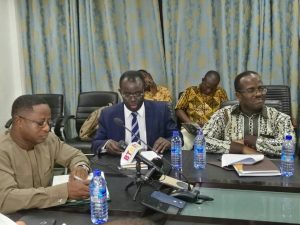–But Does the government Care!
 Ghana’s West African neighbours are threatening to end the country’s decades of gold mining industry dominance following the introduction of several sweeping reforms in their various countries.
Ghana’s West African neighbours are threatening to end the country’s decades of gold mining industry dominance following the introduction of several sweeping reforms in their various countries.
According to the industry experts, these reforms are yielding positive results at the time the world’s largest producers of gold-South Africa and Ghana are catching cold in the more than two years dip in production volumes of gold and its prices on the international market.
The Chief Executive Officer of Ghana Chamber of Mines, Sulemanu Koney who is unhappy with this development explained to members of Journalists for Business Advocacy (JBA), offshoot of the Ghana Journalists Association (GJA) that Burkina Faso, Cote D’Ivoire, and Senegal often described as newcomers in gold mining are poised to dethrone Ghana from the number one position in the ECOWAS region.
Unlike Ghana, he noted : “Reforms in the mineral code of Burkina Faso has positioned the country as a significant site for exploration in Africa”.
Similarly, Cote D’Ivoire revised mining code has been hailed as the “game changer” on the African continent. That Ghana’s western neighbour has overtaken it in terms of green field projects, Mr Koney told the journalists at a day’s encounter organised by the JBA in collaboration with the Chamber.
Senegal is also actively encouraging investments into mining sector, he stated.
Another area, the three neighbouring countries are leveraging on to take over the gold mining sector is taxation. Experts say taxes in these countries are less as against Ghana which taxes all the processes of mining.
This single act serves as a disincentive to investors which usually seek to invest in countries with flexible investment climate.
Comparing Ghana’s gold production last year to its peers, the Thomson Reuters GFMS Surveys on gold indicated that Ghana completed the list as the 10th largest gold producer with an output of 1082 tonnes, representing 3.4% of global mine production.
However, Burkina Faso and Cote D’Ivoire recorded output increased by 10% to 38.5 tonnes and 32.3% to 18 tonnes respectively. This was chiefly on account of ramp up in green field projects, the report noted.
Furthermore, although there are incentives for exploration companies in Burkina Faso, Cote D’Ivoire, and Senegal, these incentives are absence in Ghana.
The Chamber of Mines CEO indicated that; “the relevance of exploration in ensuring a pipeline of future viable projects cannot be over-emphasised. Naturally, this would ensure that the country continues to benefit from its mineral wealth at all times”.
Mr Koney therefore called on the government to consider exempting exploration companies from payment of Value Added Tax (VAT) on drilling and laboratory services, as being done in the neighbouring countries.
Such a measure, he argued would not only reduce the cash flow and other related constraints or costs borne by these companies but also enhance the country’s image as a competitive destination for exploration investment.
Despite the general decline in the core mining cost metric, Ghana continues to be a relative high cost destination for mining investments. As producing member companies of Ghana Chamber of Mines’ all-in-sustaining cost, which is the summation of exploration, development, depreciation, depletion, amortization and cash costs, dropped from $1,387 per ounce in 2013 to $1,001 per ounce in 2014, representing a drop of 27%, according to the Chamber’s 2014 annual report.
Similarly, it stated that the all-in-cost declined by 28% to $1,058 per ounce in 2014, relative 1,473 per ounce in 2013. The all-in-cost is measured as the sum of all-in-sustaining-cost, indirect and corporate costs.
In spite of all these positive developments taking place in our neighbouring countries, it appears that the Ghanaian government does not care to lose its gold supremacy.
African Eye News.com





